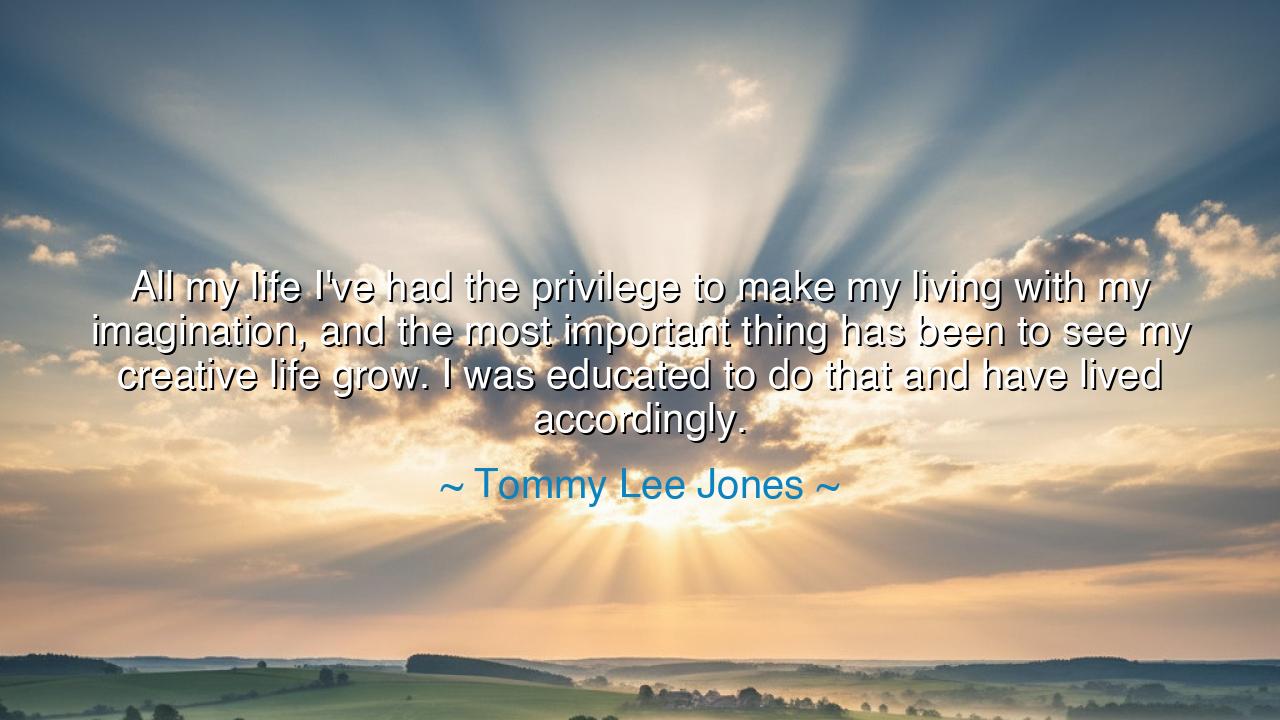
All my life I've had the privilege to make my living with my
All my life I've had the privilege to make my living with my imagination, and the most important thing has been to see my creative life grow. I was educated to do that and have lived accordingly.






"All my life I've had the privilege to make my living with my imagination, and the most important thing has been to see my creative life grow. I was educated to do that and have lived accordingly." These words, spoken by the esteemed actor and artist Tommy Lee Jones, carry with them not only the reflection of a life lived with purpose but a powerful message about the role of imagination in shaping one’s destiny. Jones speaks of a life where imagination was not merely a tool for creative expression, but the very foundation upon which he built his career. It was through his imagination that he carved his path in the world, finding both success and meaning. And in this process, the most significant reward, he suggests, was the ability to witness the growth of his creative journey—an evolution nurtured by his education and his commitment to living in alignment with his creative aspirations.
In the ancient world, artists, philosophers, and scholars were often regarded as the stewards of imagination. The Greek philosophers, particularly Plato, understood that the imagination was not just a fleeting fancy or an idle pastime, but a conduit to higher truths. For Plato, the realm of forms was not accessible through physical senses but through the mind’s ability to envision the ideal. In his works, he often praised those who could transcend the tangible world and dive into the vastness of the mind, for it was in this space that true wisdom and creativity resided. Like Plato’s ideal, Jones’ life shows us that the act of nurturing and expanding the imagination is not only a gift—it is a calling, one that, when pursued with dedication, can lead to profound growth.
Consider the life of Leonardo da Vinci, whose name is synonymous with both art and imagination. Da Vinci, much like Jones, was educated to see the world through the lens of the creative mind. His training in the arts, his study of anatomy, his fascination with mechanics—all were expressions of his commitment to allowing his imagination to flourish. Da Vinci did not simply create for the sake of beauty; he created in pursuit of a deeper understanding of the universe, with an innate drive to merge science and art. His creations, such as the Vitruvian Man or his designs for flying machines, were not born from practicality alone but from a wild, untamed imagination that dared to dream beyond the confines of his era. Like Jones, da Vinci lived according to the education he received—to create, to imagine, and to let his mind grow without bounds.
Jones, much like da Vinci, acknowledges the privilege of living a life where his imagination was not only nurtured but actively engaged in his work. This speaks to the power of an education that fosters creativity. In ancient times, great minds like Socrates and Aristotle emphasized the importance of education in forming the imagination, the mind's ability to envision what is not yet seen. It was through study and experience that one could expand their capacity for creativity. Jones’ words remind us that the creative life is not a random occurrence but a conscious, purposeful journey that begins with a foundation of learning and grows through passion and commitment.
This lesson is not reserved solely for those who are in the arts, but for all who seek to create, to build, and to shape the world around them. The imagination is a universal gift—whether in science, business, or community leadership. To build a life of growth, one must cultivate this power, allowing it to evolve and expand over time. Consider the life of Marie Curie, whose imagination was pivotal in her groundbreaking research on radioactivity. Like Jones, Curie was educated to push the boundaries of knowledge, and she did so by nurturing her imagination, daring to see beyond the accepted limits of her time. Through her commitment to her creative vision, she unlocked the mysteries of the atom, forever altering the course of scientific discovery.
The essence of Jones' quote speaks to the freedom and discipline of a creative life. It is not enough to have a wild imagination and simply dream—it must be cultivated with care, honed through education, and allowed to grow through continuous effort. Just as Michelangelo could not carve the David without first seeing it in his mind's eye, so too must we approach our own creative endeavors with patience and faith in our vision. The journey of creation is not easy, but it is one of profound reward, as it allows us to witness the unfolding of something that began as a mere thought and evolved into a reality that touches the lives of others.
Thus, the lesson of Tommy Lee Jones is clear: to live a life of imagination is to live a life of growth and purpose. It requires both the freedom to dream and the discipline to turn those dreams into reality. To build a life rooted in creativity, we must first educate ourselves, then continue to nurture our imagination, and lastly, live with the courage to see it through. Whether through art, science, or any other path, the imagination is the foundation upon which great achievements are built. Let us, therefore, embrace our own creative potential, allowing it to grow and flourish with each passing day, and shape the world around us with the fruits of our imagination.






AAdministratorAdministrator
Welcome, honored guests. Please leave a comment, we will respond soon